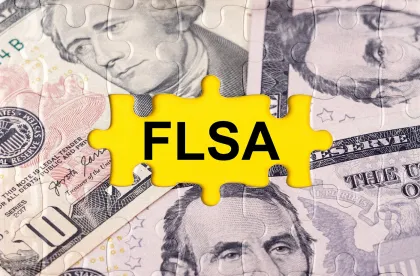Since the U.S. Supreme Court’s 2017 decision in Bristol-Myers Squibb Co. v. Superior Court of Cal., 137 S. Ct. 1773, limiting the scope of a court’s jurisdiction over out-of-state claims, federal courts have grappled with whether the landmark opinion applies to collective actions brought under the Fair Labor Standards Act (FLSA), 29 U.S.C. § 216(b).
Joining two other circuits, the U.S. Court of Appeals for the Third Circuit has held that Bristol-Myers does apply to FLSA collective actions, and therefore, federal courts may not exercise jurisdiction over claims of out-of-state opt-in plaintiffs in putative collective actions, other than in the states in which the employer has its principal place of business or is incorporated. Fischer v. Federal Express Corp., No. 21-1683 (3d Cir. July 26, 2022). The Third Circuit has jurisdiction over Delaware, New Jersey, and Pennsylvania.
Background
Christa Fischer, a Pennsylvania resident, was a security specialist for Federal Express (FedEx) in Pennsylvania. She filed a putative FLSA overtime collective action alleging she and similarly situated security specialists across the country were misclassified as independent contractors. Two New York-based FedEx employees filed consents to join the suit.
However, citing Bristol Myers-Squibb, and noting that their claims did not “arise out of or relate to FedEx’s contacts with Pennsylvania,” the district court in Pennsylvania found it lacked jurisdiction over the out-of-state plaintiffs’ claims. It certified a collective limited to FedEx security specialists employed in Pennsylvania.
On Collective Actions, Widening Circuit Split
In Bristol-Myers, a mass tort action, the Supreme Court held that a state court could not exercise specific personal jurisdiction over nonresident plaintiffs’ claims against a nonresident company. Federal district courts have issued conflicting decisions on whether the holding applies to collective actions.
In Fischer, the Third Circuit became the third federal circuit court of appeals to find that federal courts lacked jurisdiction over nonresident members of a putative collective and that opt-in plaintiffs must demonstrate the court has personal jurisdiction with respect to each of their claims.
Both the Sixth Circuit, in Canaday v. Anthem Cos., Inc., 9 F.4th 392 (2021), and the Eighth Circuit, in Vallone v. CJS Solutions Group, LLC, 9 F.4th 861 (2021), have ruled that Bristol-Myers jurisdictional principles apply to bar out-of-state opt-in plaintiffs in collective actions brought where general jurisdiction does not attach. (The Sixth Circuit covers federal courts in Kentucky, Michigan, Ohio, and Tennessee; the Eighth Circuit covers Arkansas, Iowa, Minnesota, Missouri, Nebraska, North Dakota, and South Dakota.) In contrast, the First Circuit (which includes Maine, Massachusetts, New Hampshire, Puerto Rico, and Rhode Island) held in Waters v. Day & Zimmermann NPS, Inc., 23 F.4th 84 (2022), that Bristol-Myers does not apply to collective actions, meaning, FLSA collectives may include members from outside the state. The Supreme Court declined to review these decisions.
The current circuit split now solidly favors employers, with three appellate courts concluding that Bristol-Myers applies in the FLSA context, limiting employees’ ability to pursue massive nationwide wage suits to the state where the employer is incorporated or has its principal place of business.
Class Actions Are Different
Federal courts also have considered whether Bristol-Myers applies to class action suits brought under Federal Rule of Civil Procedure 23. Several federal appeals courts have ruled that Bristol-Myers does not apply to Rule 23 class action suits. In Lyngaas v. Curaden AG, 992 F.3d 412 (2021), the Sixth Circuit noted, “Long-standing precedent shows that courts have routinely exercised personal jurisdiction over out-of-state defendants in nationwide class actions.” In Mussat v. IQVIA, Inc., 953 F.3d 441 (2020), the Seventh Circuit held, “[T]he principles announced in Bristol-Myers do not apply to the case of a nationwide class action filed in federal court under a federal statute.” The District of Columbia Circuit, adopting similar reasoning, affirmed a district court’s refusal to dismiss nonresident members of a putative class.
The Third Circuit panel agreed with its sister circuits. In a class action, the appeals court explained, “the relevant claim is the claim of the class,” not the individual plaintiffs, so jurisdictional questions are analyzed “with respect to the class as a whole, as exemplified by the named plaintiff.” Therefore, like the Sixth Circuit, the Third Circuit has found that Bristol-Myers does apply to collective actions, but it does not apply to class actions.
In applying Bristol-Myers to the putative collective action at hand, the Third Circuit rejected an attempt by out-of-state plaintiffs to analogize FLSA collective actions to Rule 23 class actions. As the Supreme Court noted in its 2013 decision in Genesis Healthcare Corp. v. Symczyk, 569 U.S. 66, there are fundamental differences between the two procedural mechanisms. An opt-in collective action is more like the mass tort action at issue in Bristol-Myers, the panel found.
Takeaway
On June 6, the U.S. Supreme Court refused to review both the First and Sixth Circuit cases, thus preserving (for now) the circuit split as to the applicability of Bristol-Myers principles to collective actions. Employers seeking to avoid defending FLSA claims on a nationwide scale, away from their principal place of business or state of incorporation, face a murky landscape without the Supreme Court breaking the circuit court split.
If a consensus emerges that Bristol-Myers applies to collective but not class actions, it may alter the calculation for plaintiffs as they decide where, and under what statute, to sue — and opting to bring duplicative FLSA suits in numerous jurisdictions or to sue employers in their principal place of business from the outset. Employers must keep in mind they can still be subjected to defending multistate collective actions. As the Third Circuit observed, notwithstanding Bristol-Myers, “potential plaintiffs retain the ability to bring nationwide collective actions in a court that can exercise general personal jurisdiction over their employer.”






 />i
/>i

